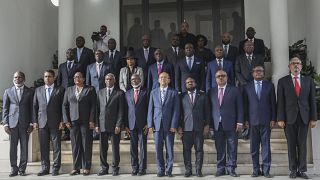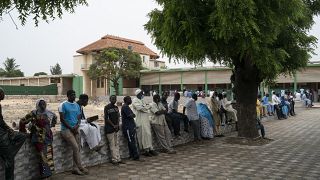Egypt
Egypt, host of the next United Nations summit on climate change, will push countries to make good on their pledges to sharply reduce greenhouse gas emissions, facilitate "non-adversarial" talks on compensation to developing countries for global warming impacts and allow climate activists to protest, said the incoming president of COP27.
In an interview on Monday with The Associated Press, the country's Foreign Minister Sameh Shoukry, who is also the president-designate of the next annual Conference of the Parties, to be held in November in the Red Sea resort city Sharm El-Sheikh, called the overall goal "implementation."
Shoukry said the last summit, held last year in Glasgow in Scotland, finalised many commitments made during the Paris Agreement in 2015, which aimed to reduce emissions and limit global warming to 1.5 Celsius (2.7 Fahrenheit) since pre-industrial times.
"The commitments and the pledges now have to be implemented in all sectors of the climate change agenda, whether it's in adaptation, mitigation or finance, loss and damage," said Shoukry, who was attending the World Economic Forum in Davos, Switzerland.
In recent years, many developing nations and activists have increased long-standing calls to establish a fund to compensate poor countries for the devastation brought about by climate change, disproportionately caused by rich countries because of past emissions.
The call was rejected during last year's summit.
Many supporters of the idea, often called "loss and damage," hope to make progress on it in November.
Their arguments could get a boost by the symbolic significance of this conference being held in Egypt, a developing nation in North Africa.
Shoukry said protests would be allowed during the conference.
Egyptian authorities crackdown on demonstrations not sanctioned by the government and retain the right to cancel or postpone any protests, leading activists to wonder what, if any, demonstrations would be able to happen, a common occurrence at previous COPs.
"We are developing a facility adjacent to the conference center that will provide them the full opportunity of participation, of activism, of demonstration, of voicing that opinion," said Shoukry.
"And we will also provide them access, as is traditionally done on one day of the negotiations, to the negotiating hold itself."
Shoukry said during meetings in Denmark earlier this month around climate pledges he invited protesters who were outside to speak with him.
He called the meeting "productive" and said that Egypt's climate goals lined up with those of many protesters.
"We recognize their impact, their determination, their commitment to keeping us all honest as governmental representatives and parties that we should not be delinquent and rising to the occasion and dealing with this very important issue," he said.
Ahead of hosting the conference, Egypt has been racing to launch many agreements around renewable energies.
In March, Egypt and Norway signed an agreement for several projects around green hydrogen and building green infrastructure projects in African countries.
Egypt and clean energy company Scatec also signed a $5 billion memorandum of understanding to establish a plant in the Suez Canal area for producing green ammonia from green hydrogen.
Such deals come on the heels of years of steady investment in wind and solar technologies.












01:38
COP29: What next for Africa's energy transition?
01:48
Mali's former environment minister launches plan to protect forests
01:26
Zimbabwe’s Climate-Smart Agriculture: Empowering Farmers through Resilience and Innovation
01:14
Delegates express cautious optimism on second day of climate summit
01:35
COP29: What do African youth expect from the climate summit?
01:12
COP29 in Baku: High stakes and a $1 trillion question for climate finance